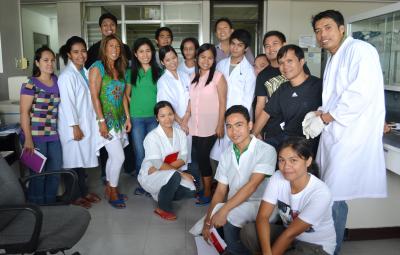NMSU biologist tweaks, teaches intensive genetics course in the Philippines

"There is a need in underdeveloped countries, particularly in Asia, to educate and develop biotechnology skills in the younger workforce - our future scientists," Nishiguchi said. "The American Society of Microbiology has a huge interest in initiating collaborative research with many underdeveloped countries and U.S. scientists. This is one way we can start."
The interactive course, "Microbial Genetics for Microbial Ecologists," aims to show how bacteria reproduce and exchange genes within and between species.
"It is especially important for biotechnology, since many of the natural processes that bacteria do are used to manipulate bacteria in the lab for various studies," Nishiguchi said.
Nishiguchi, who taught the course in English, modified the College of Arts and Sciences' semester-long course into an intensive two-week class with a lab. Adjusting for culture-based differences, Nishiguchi also introduced the 20 students to Western-style teaching and learning. She incorporated active learning with group activities, collaborative exercises and oral presentations.
"They were so amazed," Nishiguchi said. "A couple of the kids would come up and say, 'I didn't understand this, and you helped me understand this in a completely different way.'"
This was Nishiguchi's first time teaching in the Philippines. Her previous visits to the islands were to conduct fieldwork and meet with her SEAFDEC collaborator.
Melina Sedano, Nishiguchi's technician and originally from El Paso, accompanied Nishiguchi and served as a teaching assistant for the course. Sedano demonstrated concepts and new techniques to the students. She received both her bachelor's and master's from NMSU.
Nishiguchi teaches invertebrate zoology at NMSU. Her research interests include evolution and marine symbiosis. For more information about her work visit The Nishiguchi Lab at http://biology-web.nmsu.edu/nish/.
The course was made possible by a grant from the American Society of Microbiology and SEAFDEC. For more information about the ASM visit http://www.asm.org/.


